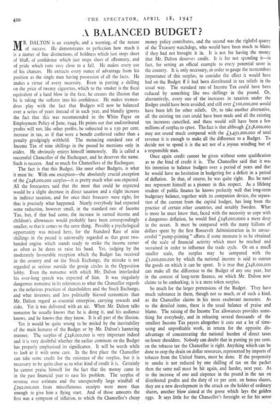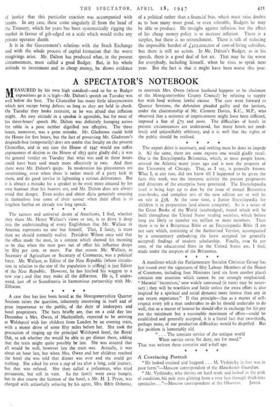A BALANCED BUDGET?
MR. DALTON is an example, and a warning, of the nature of success. He demonstrates to perfection how much it is a matter of fine distinctions, of boldness which just stops short of bluff, of confidence which just stops short of effrontery, and of pride which runs very close to a fall. He makes every use of his chances. He extracts every ounce of advantage from his position as the single man having possession of all the facts. He makes a virtue of every necessity. Even in putting a shilling on the price of twenty cigarettes, which to the smoker is the fiscal equivalent of a hard blow in the face, he creates the illusion that he is taking the sufferer into his confidence. He makes tremen- dous play with the fact that Budgets will now be balanced over a series of years instead of in each year, and blandly ignores the fact that this was recommended in the White Paper on Employment Policy of June, 1944. He points out that undistributed profits will not, like other profits, be subjected to a 15o per cent. increase in tax, as if that were a benefit conferred rather than a penalty grudgingly withheld. The menacing standard rate of Income Tax of nine shillings in the pound he mentions only in asides. He obviously enjoys himself immensely. He is called a successful Chancellor of the Exchequer, and he deserves the name. Such is success. And so much for Chancellors of the Exchequer.
The fact is that this Budget, like most other Budgets, is what it must be. With one exception—the absolutely crucial exception of the £248,000,000 surplus—it is pretty much what was expected. All the forecasters said that the most that could be expected would be a slight decrease in direct taxation and a slight increase in indirect taxation, and for once their forecasts were right, for that is precisely what happened. Nearly everybody had expected some reduction, however small, in the standard rate of Income Tax, but, if that had come, the increase in earned income and children's allowances would probably have been correspondingly smaller, so that it comes to the same thing. Possibly a psychological opportunity was missed here, for the Standard Rate of nine shillings in the pound is universally regarded as that great two- handed engine which stands ready to strike the income earner as often as he dares to raise his head. Yet, judging by the moderately favourable reception which the Budget has received in the country and on the Stock Exchange, the mistake is not regarded as serious outside the gossip circles in the Opposition lobby. Even the nonsense with which Mr. Dalton interlarded his over-long speech was expected of him. It was singularly dangerous nonsense in its references to what the Chancellor regards as the nefarious practices of shareholders and the Stock Exchange, and what investors and less politically biassed economists than Mr. Dalton regard as essential enterprise, carrying rewards and risks. Yet it was delivered with an air. When Mr. Dalton talks nonsense he usually knows that he is doing it, and his audience knows, and he knows that they know. It is all part of the illusion.
Yet it would be quite wrong to be misled by the inevitability of the main features of the Budget or by Mr. Dalton's bantering manner. The surplus of £248,000,000 is very important indeed and it is very doubtful whether the earlier comment on the Budget has properly emphasised its significance. It will be worth while to look at it with some care. In the first place the Chancellor can take some credit for the existence of the surplus, but it is necessary to be quite clear as to what kind of credit it is. Certainly he cannot praise himself for the fact that the money came in in the past financial year to ease his problem. The surplus of revenue over estimate and the unexpectedly large windfall of £292,000,000 from miscellaneous receipts were more than enough to give him a flying start. And of those amounts the first was a symptom of inflation, to which the Chancellor's cheap money policy contributes, and the second was the rightful quarry of the Treasury watchdogs, who would have been much to blame if they had not brought it in. It is not for having the money that Mr. Dalton deserves credit. It is for not spending it—in fact, for setting an official example to every potential saver in the country. It is only necessary, in order to gauge the tremendous importance of this surplus, to consider the effect it would have had on the Budget ff it had been distributed in tax reliefs in the usual way. The standard rate of Income Tax could have been reduced by something like two shillings in the pound. Or, alternatively, every one of the increases in taxation under the Budget could have been avoided, and still over £x00,000,000 would have been left for other reliefs. Or, to take another alternative, all the existing tax cuts could have been made and all the existing tax increases cancelled, and there would still have been a few millions of surplus to spare. The fact is that although £2 48,000,00o may not sound much compared with the L3451000,000 of total revenue it is enough to make all the difference to a Budget. To decide not to spend it is the act not of a joyous windbag but of a responsible man.
Once again credit cannot be given without some qualification as to the kind of credit it is. The Chancellor said that it was his intention to balance budgets over a period of years and that he would have no hesitation in budgeting for a deficit in a period of deflation. In that, of course, he was quite right. But he need not represent himself as a pioneer in this respect. As a lifelong student of public finance he knows perfectly well that long-term budgetary balance, together with its companion device, the separa- tion of the current from the capital budget, has long been the practice of certain other countries, and notably Sweden. What is more he must know that, faced with the necessity to cope with a dangerous deflation, he would find £248,000,0000 a mere drop in the ocean. It must be compared with the many billions of dollars spent by the first Roosevelt Administration in its unsuc- cessful " pump-priming " efforts if some measure is to be obtained of the scale of financial activity which must be reached and sustained in order to influence the trade cycle. Or on a muct smaller scale, the surplus may be compared with the £1,000,000,000 by which the national income is said to outrun the goods on which it can be spent. It is true that £248,000,000 can make all the difference to the Budget of any one year, but in the context of long-term finance, on which Mr. Dalton now claims to be embarking, it is a mere token surplus.
So much for the larger pretensions of the Budget. They have much substance in them, though not so much, or of such a kind, as the Chancellor claims in his more exuberant moments. As to the detailed items, there is the usual balance of praise and blame. The raising of the Income Tax allowances provides some- thing for everybody, and in releasing several thousands of the smallest Income Tax payers altogether it cuts out a lot of time- using and unprofitable work, in return for the opposite dis- advantage of concentrating the national burden of direct taxes on fewer shoulders. Nobody can doubt that in putting so per cent. on the tobacco tax the Chancellor is right. Anything which can be done to stop the drain on dollar resources, represented by imports of tobacco from the United States, must be done. If the propensity to smoke is not reduced by one shilling of tax on the packet then the same nail must be hit again, and harder, next year. As to the increase of one and sixpence in the pound in the tax on distributed profits and the duty of to per cent. on bonus shares, they are a new development in the attack on the holder of ordinary shares, another blow aimed at the goose which lays the golden eggs. It says little for the Chancellor's foresight or for his sense of justice that this particular exaction was, accompanied with taunts. In any case, these come singularly ill from the head of the Treasury, which for years has been systematically rigging the market in favour of gilt-edged on a scale which would strike any private operator dumb.
It is in the Government's relations with the Stock Exchange and with the whale process of capital formation that the worst misgivings arise. Mr. Dalton has produced what, in the present circumstances, must called a good Budget. But, in his whole attitude to investment and to cheap money, he shows evidence of a political rather than a financial bias, which must raise doubts as to how many more good, or even tolerable, Budgets he may be able to produce. He inveighs against inflation, but the effect of his cheap money policy is to increase inflation. There is a surplus, but there is no retrenchment. There is talk of reducing the impossible burden of £425,000,000 of cost-of-living subsidies, but there is still no action. In Mr. Dalton's Budget, as in his speech, there is a good deal of hot air. That may be the worse for everybody, including himself, when he rises to speak next year. But the fact is that it might have been worse this year.



































 Previous page
Previous page